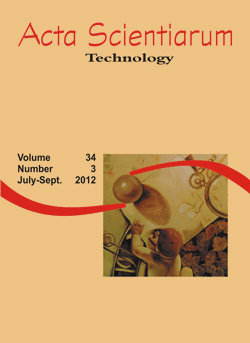<b>Masonry concrete block strength compound with sawdust according to residue treatment</b></b> - doi: 10.4025/actascitechnol.v34i3.14372
DOI:
https://doi.org/10.4025/actascitechnol.v34i3.14372Keywords:
composite, cement-wood, masonry blocksAbstract
The behavior of building blocks with the partial replacement of fine aggregates by sawdust is evaluated. The parameter adopted comprised analysis of the compressive strength according to the treatment applied to sawdust residue of the species Dinizia Excelsa Ducke (red angelim). Blocks were composed by replacing fine aggregates by sawdust at 5% weight. Before mixing the wood residues to the concrete, the former underwent treatment so that wood residues could be compatible with the cement matrix. Two treatment processes were investigated. The first treatment comprised the washing of residues in an alkaline solution (lime) at a 5% proportion (weight / weight). The second treatment comprised the immersion of the residue in aluminum sulfate. Analysis was undertaken from compressive strength assays of the blocks on the 7th and 28th day. Results showed low efficiency in the alkaline-based treatment (lime) and good performance in the aluminum sulfate-based treatment. The production of masonry blocks with a replacement of 5% fine aggregates for this type of treatment and species studied is possible.
Â
Downloads
Downloads
Published
How to Cite
Issue
Section
License
DECLARATION OF ORIGINALITY AND COPYRIGHTS
I Declare that current article is original and has not been submitted for publication, in part or in whole, to any other national or international journal.
The copyrights belong exclusively to the authors. Published content is licensed under Creative Commons Attribution 4.0 (CC BY 4.0) guidelines, which allows sharing (copy and distribution of the material in any medium or format) and adaptation (remix, transform, and build upon the material) for any purpose, even commercially, under the terms of attribution.
Read this link for further information on how to use CC BY 4.0 properly.











8.png)




